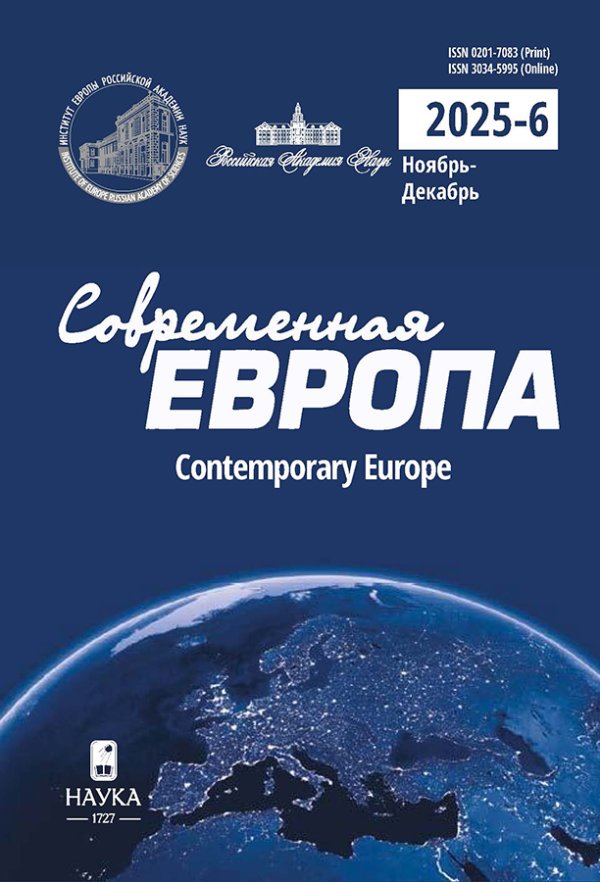“Progressive realism”: between continuity and change of the UK foreign policy
- Authors: Godovanyuk К.A1
-
Affiliations:
- Institute of Europe, Russian Academy of Sciences
- Issue: No 7 (128) (2024)
- Pages: 44-58
- Section: EUROPEAN PROCESS: COUNTRIES AND REGIONS
- URL: https://journal-vniispk.ru/0201-7083/article/view/279993
- DOI: https://doi.org/10.31857/S0201708324070040
- ID: 279993
Cite item
Full Text
Abstract
The article explores the contours of the UK foreign policy of the Labour government of K. Starmer in the context of persistent strategic dilemmas. Through the use of the theory of change, the author’s analysis of the new Cabinet’s foreign policy focuses on its attempts to refurbish the ideology behind the international course, driven by the goals of change and the departure from the Tory legacy. At the same time, external stimuli (fragmentation and newly emerged centers), domestic political factors (the political legacy of the Brexiteers, inter-party consensus on key areas of foreign policy, public opinion), as well as previous foreign policy goals leave Labour little room for maneuver and a qualitative change of course. In foreign policy planning, the new government, on the one hand, draws upon the practical developments of its Tory opponents in the spirit of neoliberalism. On the other hand, it maneuvers between the realism and idealism of previous Labour governments. The novelty introduced by the Labour Cabinet has been “progressive realism”. Central to this approach is shifting of emphasis in relation to Europe and trade, economic and military-political rapprochement with Brussels, as well as strengthening ties with the countries of the Global South while dropping the Global Britain rhetoric. NATO-first as a basic parameter of foreign policy stays put and dictates the logic of relations with the main centers of power in the Washington-Brussels-Beijing triangle, which corresponds to the approach of previous Conservative governments. At the same time, London promotes itself as a responsible player, keen on distancing itself from postcolonial practices. The article looks in detail at the first steps of the incumbent Cabinet in the foreign policy arena in the Euro-Atlantic and Indo-Pacific directions. London's attempts to build an image of a responsible player that distances itself from postcolonial practices and is guided by human rights and “moral leadership’, do not fundamentally change London’s foreign policy line. The uncompromising position on Ukraine against the backdrop of dependence on the “US factor” confirms the contradictory nature of the new concept, which may be adjusted with the arrival of a new White House administration.
Keywords
About the authors
К. A Godovanyuk
Institute of Europe, Russian Academy of Sciences
Email: kira.godovanyuk@gmail.com
Candidate of Sciences (Politics) Moscow, Russia
References
- Алешин А.А. (2023) Роль Британии в формировании антироссийской политики Запада. Современная Европа. № 5. С. 44‒56. doi: 10.31857/S0201708323050042 EDN: xzppri
- Aleshin А.А. (2023) Rol' Britanii v formirovanii antirossijskoj politiki Zapada [The UK’s Role in Shaping the Anti-Russian Policy of the West], Sovremennaya Evropa, 5, pp. 44‒56. doi: 10.31857/S0201708323050042 EDN: xzppri (In Russian).
- Ананьева Е.В. (2024) Парламентские выборы в Британии 2024 г. Нетриумфальный триумф лейбористов. Современная Европа. № 5. С. 98‒111. doi: 10.31857/S0201708324050085
- Ananieva E.V. (2024) Parlamentskie vybory v Britanii 2024 g. Netriumfal'nyj triumf lejboristov [UK General Election-2024: Labour’s Untruimpant Triumph], Sovremennaya Evropa, 5, pp. 98‒111. doi: 10.31857/S0201708324050085 (In Russian).
- Ананьева Е.В., Охошин О.В. (2023) Британия-2022: смена премьеров, смена монарха. ИЕ РАН, Москва. 194 с. DOI: http://dx.doi.org/10.15211/report22023_399
- Ananieva E.V., Okhoshin O.V. (ed.) (2023) Britaniya-2022: smena prem'erov, smena monarkha [The UK-2022: Change of Prime Ministers, Change of Monarch], IE RAN, Moscow, Russia. DOI: http://dx.doi.org/10.15211/report22023_399 (In Russian).
- Годованюк К.А. (2024) Китайская стратегия Великобритании: непоследовательная последовательность на фоне внутренних дебатов. Актуальные проблемы Европы. № 4(124). С. 144‒164. doi: 10.31249/ape/2024.04.08 EDN: MXVHEP
- Godovanyuk К.А. (2024) Kitajskaya strategiya Velikobritanii: neposledovatel'naya posledovatel'nost' na fone vnutrennih debatov [UK strategy towards China: inconsistent consistency amid internal political debate], Aktual'nye problemy Evropy, 4(124), pp. 144‒164. doi: 10.31249/ape/2024.04.08 EDN: MXVHEP (In Russian).
- Громыко Ал.А. (ред.) (2023) Европа в глобальной пересборке. Весь Мир, Москва. 508 с.
- Gromyko Al.A. (ed.) (2022) Evropa v global'noj peresborke [Europe in a global reassembly], Ves’ Mir, Moscow, Russia. doi: 10.55604/9785777708953 (In Russian).
- Hadfield A., Whitman R.G. (2023) The diplomacy of “Global Britain”: settling, safeguarding and seeking status. Int Polit. 05.07. DOI: https://doi.org/10.1057/s41311-023-00489-x
- Hermann C.F. (1990) Changing Course: When Governments Choose to Redirect Foreign Poli-cy. International Studies Quarterly. No. 34. P. 3–21.
- Haugevik K., Svendsen Ø. (2023) On safer ground? The emergence and evolution of “Global Britain”. International Affairs. No. 99. P. 2387–2404. doi: 10.1093/ia/iiad186
- Martill B., Rogstad A. (2024) A Debate of the Highest Order: The Brexit Referendum as Second-Order Role Contestation. Foreign Policy Analysis. Vol. 20. Issue 3. DOI: https://doi.org/10.1093/fpa/orae013
- Martill B., Mesarovich A. (2024) Foreign Policy as Compensation: Why Brexit Became a Foreign and Security Policy Issue. International Studies Quarterly. Vol. 68. Issue 2. DOI: https://doi.org/10.1093/isq/sqae014
- Martill B. (2024) Return to Europe? Institutional choice, outsider status, and Britain’s response to the Ukraine War. The British Journal of Politics and International Relations. P. 1‒23. doi: 10.1177/13691481241291431
- McDonald S. (2023) Beyond Britannia. Reshaping UK Foreign policy. Haus Publishing Ltd, London, UK. 278 p.
- Parnell T. (2022). Unravelling the Global Britain vision? International relationships and na-tional identity in UK Government documents about Brexit, 2016–2019. Discourse & Society. No. 33(3). P. 391‒410. DOI: https://doi.org/10.1177/09579265221076588
- Potter Ph.B.K. (2017) Methods of Foreign Policy Analysis. Oxford Research Encyclopedia of International Studies. 30.11. DOI: https://doi.org/10.1093/acrefore/9780190846626.013.34
- Vickers R. (2011) The Labour Party and the World. Volume 2: Labour’s Foreign Policy Since 1951. Manchester University Press, Manchester, UK. 256 p.
Supplementary files










